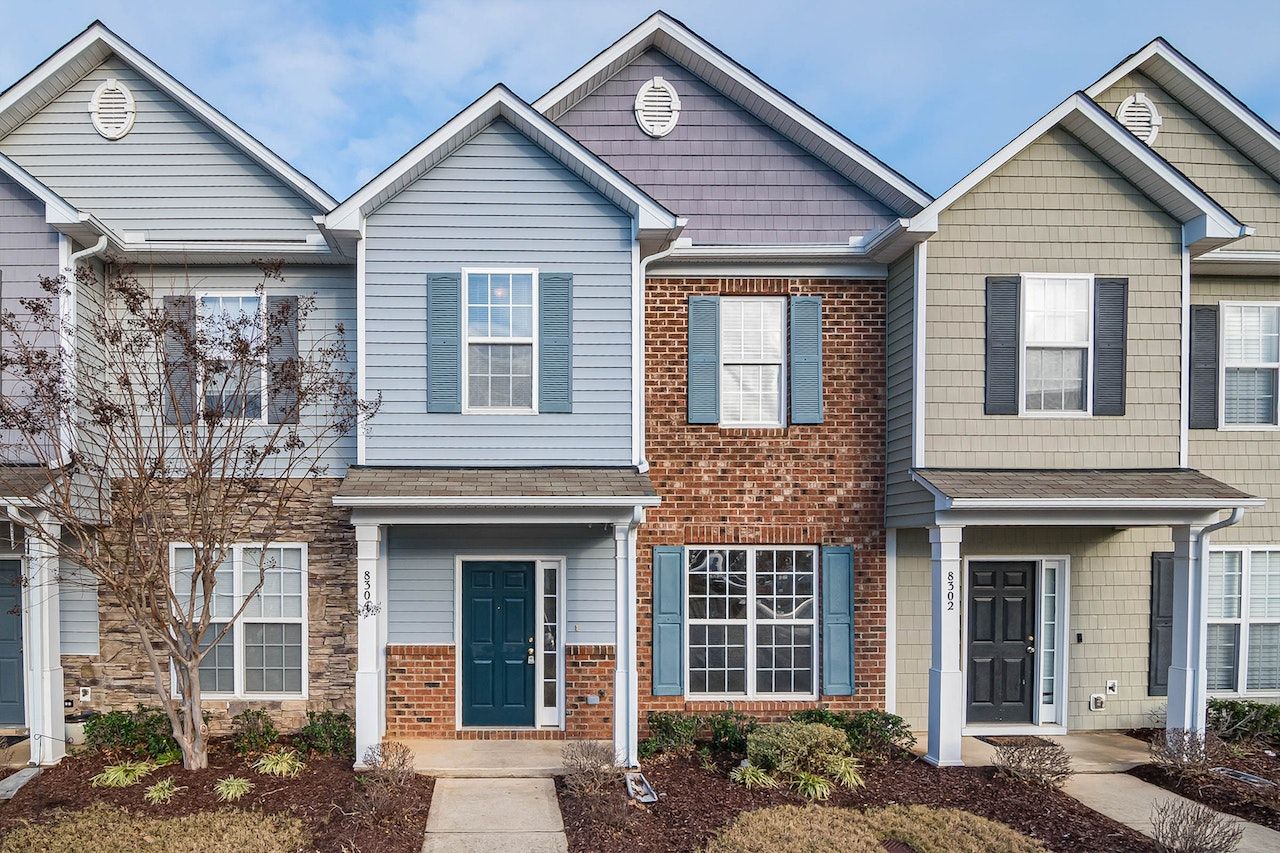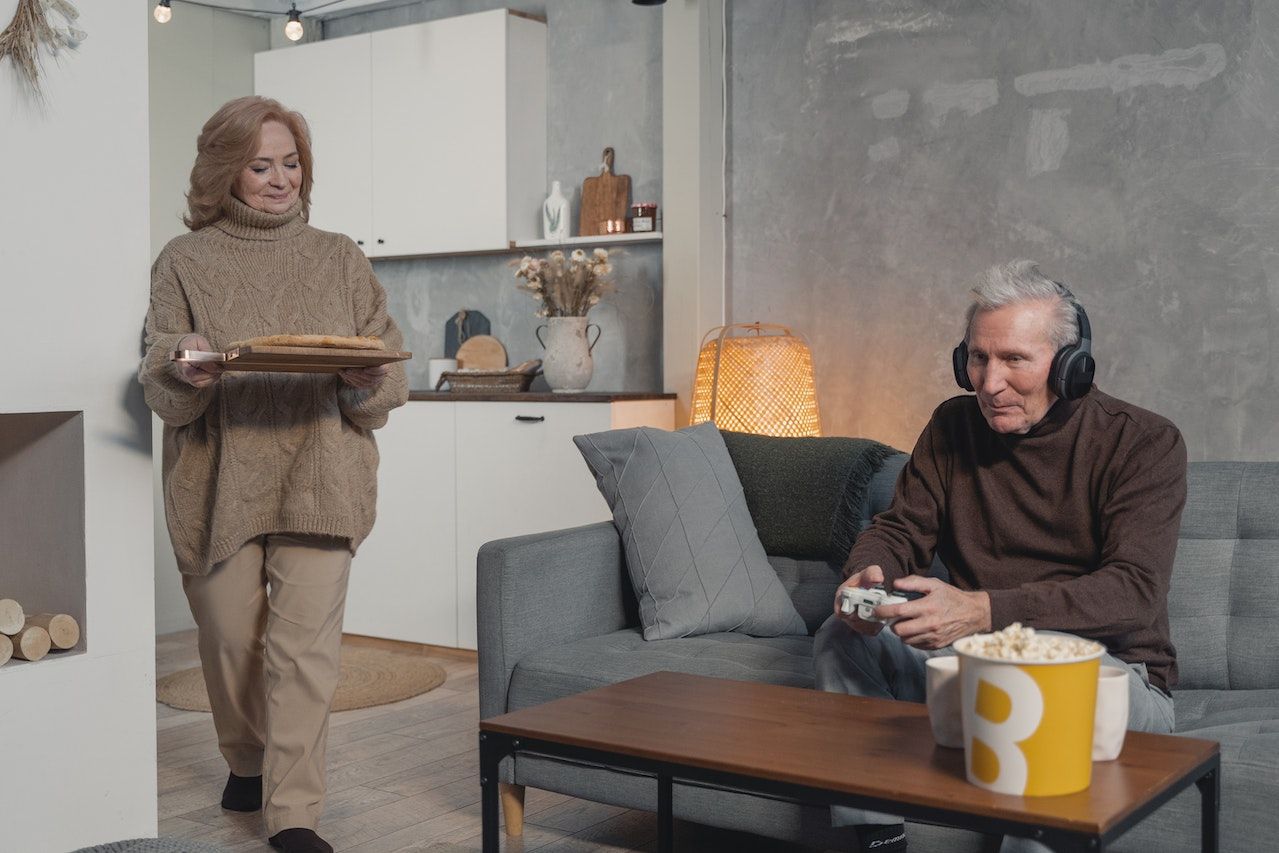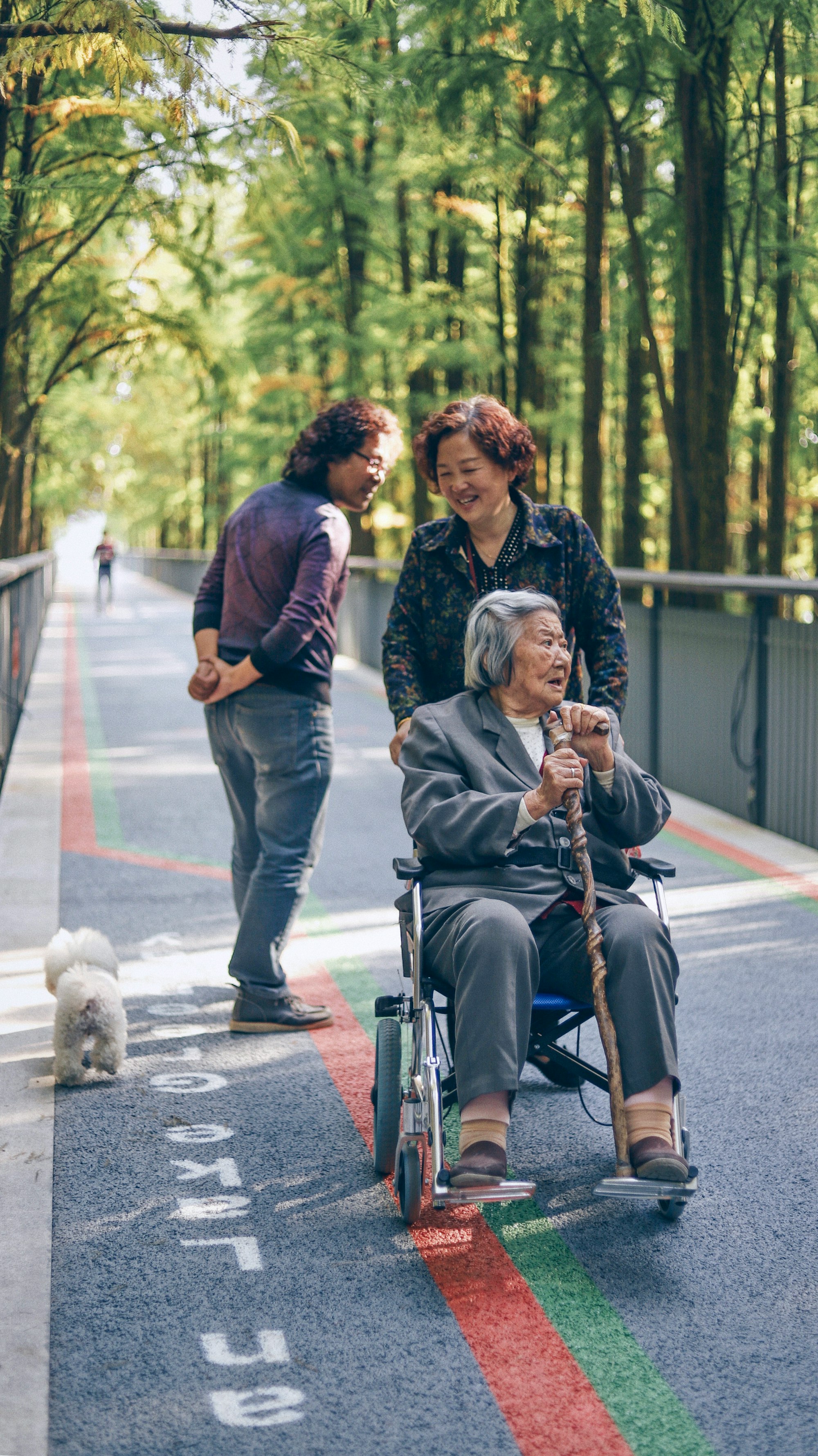Aging in Place Older Adults Remaining in Their Own Home
Aging in place is a concept that involves many different processes that address the ever changing needs of the older adults.

Aging in place is a concept that involves many different processes that address the ever changing needs of the older adults. These processes address the needs in a manner so that the older adults may remain in their own home and community for as long as possible.
Simply put, aging in place allows the older adult to receive care that they need in the setting of their choice, safely, comfortably, at any ability level. It gives any individual the opportunity to call their house a home for their lifetime. As older adults age in place the community they live in will need to get creative on how to support them.
So how do you prepare for our future care needs? And when should I start planning?
There are many aspects to aging in place that I will cover briefly in this lesson.
According to AARP, 80 million baby boomers will begin to retire in the next few years. Retirement planning to age in place with caregiving services is a conscious decision by many older adults presently living in their own homes. The average length of retirement to death is 18 years on average. So there is a lot to plan for as we get older.
We live longer and healthier lives, baby boomers are changing the way future generations will view aging. In fact, many boomers are already experiencing caring for an elderly parent. Many have first hand knowledge of caring for a parent and have dealt with home care services, adult day care programs and have made home modifications to ensure home safety.
Many already know what a long term care facility or assisted living is like and do not want it for themselves. Sixty five percent of the baby boomers over age 65 will require some form of long-term care. While we are planning, a major crisis is occurring in this country.
For the first time in history, we have more seniors than youth. This has created a shortage of people to provide care for the aging population. We also have a major shortage of direct care workers that would support older adults that want to age in place. This is leaving many family caregivers leaving the workforce to provide care at home.
Planning ahead and preparing for aging in place can make the difference between being able to return home or having to go to a nursing home, because the house cannot accommodate you. Falls are the number one independance robber of seniors. One fall many keep an elderly person from returning home because home modifications were never made to accommodate the aging body.
It would be nice if we had a crystal ball and could see into our health issues in the future. Since that is not possible, we cannot anticipate a broken hip or capacitating illness. I am going to remind my listeners that falls are the number one independence robber of the elderly. One fall can prevent you from ever returning to your own home or your community.
It happens all the time. Here's a perfect example. I was walking a dog the other day. I come up on an elderly woman laying flat at the end of her driveway. She was an 80 yr old female that was out raking leaves and fell backwards. As I am trying to assess the situation, I learned she lost her husband this year, had a total hip just a few months before and had a bad knee. She was a candidate for a total knee in the very near future. Se had been there for almost an hour. She lives basically in good health, otherwise. My point is, you never know when a situation will arise that will change your life forever. that is why it is so important when you plan to aging in place , you put things in place to be successful. There are many senior resources Wanda did not have in place .
We can, however, put things in place to make things easier for us should a medical crisis occur.
Let’s just step back for a moment and consider a few things:
What if I have a medical emergency, who will have the medical and insurance information to make sure I get timely care?
What if I was in a wheelchair, even for a few weeks, could I get around the house?
If I am unable to care for myself, who will care for me?
If I live like this for years, who will pay for it?
If I needed care, would insurance pay for it?
If I was unable to voice my opinions or express my end of life wishes and care, who would do that for me?
What if something happened to me and I was unable to physically or mentally/cognitively pay my bills. Who would take care of it for me?
These are questions that you be asking yourself while you are still healthy and in a good state of mind. These are questions that you need to have answered to develop a plan to successfully age in place.
Planning Ahead

The most important part of aging in place is getting organized and putting all the legal and medical paperwork in order.
This is probably the most difficult task for many individuals to face, but it is the most important. Taking the time to address and give consideration to the serious topics of several of these documents will allow you to have a say and control over your care should you become unable to make those wishes known.
Getting organized and putting the paper work in order will not only save you undue stress in the future, it will allow you and your family to make educated and informed decisions regarding your care when the time comes.
Let’s go over what things should be organized for easy accessibility: Medical history, health insurance, life insurance, long term care insurance policy ,veteran benefits, financial information, will and estate planning, advanced directive, Power of attorney for health (also know as health care proxy) and finances and funeral arrangements.
Here is a brief overview of the important legal and medical documents:
Advanced directive is a legal document that allows you to make your medical/healthcare wishes known to your family, friends and medical personnel in the event you become unable to make decisions for yourself. (Ex: stroke, coma,) and you are unable to express yourself. A good advanced directive describes the treatments you would want or do not want depending on how sick you are. I recommend Five Wishes (FiveWishes.org) because it takes a holistic approach and is thought provoking.
Health care proxy/Power of Attorney (POA) for Health care- A health care power of attorney/health care proxy is a person that you have chosen to make your medical decisions in the event you are unable to do so. This is a person that you trust and shares the same values as you do. This should also be a person that you are able to discuss end of life decisions with and feel comfortable they will honor your wishes.
Power of attorney (POA) for finances- This is a person that you have chosen that will mange your financial affairs should you be unable to do so. This may be the same person as the health care power of attorney, but does not have to be. This should be a person that you trust and one you feel will not abuse the power you have given them.
Will and estate planning – Estate planning is not for the rich any more. It is putting a plan in place that allows your family and the financial goals you want to accomplish for them to be met, after you die. Estate planning is a process that includes writing a will, but also involves including your financial assets, business (if there is any), medical, all insurance information and family in that planning process.
It is a process that should be started early if you have assets you want to protect. There are many benefits to having a will and trusts in place. It is your last opportunity to have a say in how you want thing done, even after you’re gone.
I know that not every one wants to plan their funeral in advance. But, there are many reason that I will address this here and now. I know that it is an uncomfortable subject for many. Many of us do not want to face the fact that we are getting older, let alone that one day we may no longer be on this earth.
Planning your funeral in advance has many advantages that I will address here today. The cost factor for one is so much less when it is taken care of prior to a death. Families when unprepared and functioning under undue stress make poor decisions. Under stress and feeling guilt and anxiety, they feel pressure to spend large amounts of money unnecessarily.
Pre planned funerals not only decreases the stress on a family, but, you, as an older adult continue to have a say and control over what you want and how you want it done. For many that is a motivating factor to plan early.
Aging in place means making your Home Your Partner

At the beginning of the lesson, I asked a few questions
So how do you prepare for your future care needs? And when should I start planning?
Well, here is the answer. That depends on you. You see, if you want to remain in your home, any time you make home modifications, you make changes to your physical environment that will allow you to stay in the comfort of your home. Making changes over time is great. IT allows you to financially make changes , a little at a time. Home safety concerns should always be a priority as you age in place.
The majority of homes we presently live in were built for the young and growing family and the young, nimble body. As we age, our bodies change, but our physical environment does not. This can be detrimental to successful aging in place.
Simple changes can make a difference and promote independence. If you are a person with arthritis, changing all the knobs on the doors to levers, over time will make your live easier.
Replacing a toilet? Make it a high toilet. Have an old style tub? Consider putting in a walk in tub. Consider making the changes before you have trouble walking.
Of course, meal preparation as you age may become more challenging. There are modifications that can be made to the home that will address your kitchen. Seniors living alone may benefit for changes to the kitchen that makes meal preparation easier. As we age, we also have vision problems. explore good lighting will help is easier to age in place.
As we age, it can become more difficult to get up from a sitting position, so be proactive and when doing remodeling, contact a Certified Aging in Place Specialists to assist you in making the right choices.
What is a Certified Aging in Place Specialist (CAPS)?

This is a certification that is the result of work done in conjunction with the National Association of Home Builders, the 50 Plus Housing National Council and AARP. They utilize the concepts of Universal, Accessible and Adaptable Design, They specialize in helping you to acheive aging in place.
The beauty of the concept of aging in place is that the changes can be appealing to the eye. This is not the institutional look of the past. Far from it, indeed.
I think you will be quite surprised to see some of the beautiful and, yet, functional changes that can be made to a home. Walk in tubs are just one of the home modifications that could make senior living independently possible. Lighting, ramps, stair lifts make daily life easier for many seniors.
Of course, safety is the number one priority as we age. Falls are the number one independence robber of the aging senior.
A CAPS specialist can assess the interior and exterior of the home and make recommendations for home modifications that would address changes to the environment regarding home safety such as lighting, barrier free entrances, grab bars etc.
Planning for Future Care Needs

I know what you are thinking, how could I possibly plan for my future care needs? What is she thinking?
I know, you do not have a crystal ball, but there are things that you can do, plans you can put in place that will help you prepare for your future. There will come a time when you will have difficulty preforming everyday tasks and you may face health problems and need increased medical care. There comes a time that you will need hep with your personal care needs. Everyday tasks become challenging. You may need in home care services to support you.
There are many things that need to be addressed in this section, so I will be brief. Planning for your future care needs means, knowing how you will be paying for those services. Do you have long term care or other health insurance ? Do you know if a reverse mortgage is beneficial for you? Do you know if you will qualify for community resources? Do you know what the resources are available to you? Do you know what types of home health care services are avaiable in your community?
Well, here is where we are going to start. You must be an informed consumer. If you are going to have a plan to age in place, then you need to do some leg work to accomplish the goals
Here is a place to start- the local office of Area on Aging. This is a federal government program that functions at the state level. They will provide you with information on government programs and community resources. There are four different veterans affairs programs that may support you as you age place. Call your local Disabled American Veterans office. They will provide you with information and guidance to find the right programs fo you.
If you have a specific diagnosis such as diabetes, Alzheimer’s, Parkinson’s that would be the next organization I would call for assistance and guidance. These organizations can provide support and resources. Some will provide disease specific information and support disease control.
If you have a specific disease diagnosis, have frequent discussions with your health professional about your future care needs. Let them know that you have long term goals and want to have a plan in place to remain in the home. You want to know your prognosis and expected course your disease may take. This is so that you can plan ahead to the best of your ability.
You may want to seek the assistance and expertise of a geriatric care manager. These individuals are trained and experienced in any of several fields related to geriatrics. They can help navigate the medical delivery system. They come from many fields: nursing, gerontology, social work, or psychology, all with a specialized focus on issues related to aging and elder care.
A Geriatric care manager can assist you with putting a plan into place, if you need assistance. The National Association of Professional Geriatric Care Managers (NAPGCM) is an organization of practitioners whose goal is the advancement of expert assistance to the elderly and their families.
The next step in this education process is becoming aware of the options available for alternative care to the home setting. Learn the difference between Medicare, that provides skilled care services and non medical in home care services.
Custodial care, or in home care is considered unskilled care. Seniors pay for non medical in home care services out of their own pocket. These services may be paid for by a long term care policy, or be paid for through a veterans program. Some states have a medicaid program that will pay for a home health aid or pay the family caregiver to provide that care.
. Other In home care providers will do everything from providing personal care support to light housekeeping, and grocery shopping and meal preparation. Some will take you for your doctor visits and other appointments, if needed. Some in home health providers will offer companion services or personal care aides. These aides will provide personal care and provide support with other activities of daily living.
Insurance pays for one, you pay out of pocket for the other. That is unless you have long term care, with a home care rider. If you do not have a cost of living rider on your policy, be aware that todays cost for home care services is not the rate of when you bought the policy. So many of my clients have experienced shock that they cannot afford to pay our of pocket for care because they live on social security. They thought that when the time cam to use their long term care policy it would cover the costs at today's rates. Not so.
Here are the different levels of care that should be considered to age in place:
Senior centers provide nutrition programs, socialization and activities that allow an older adult to get out of the house and enjoy the day. As we age we lose friends. Going to a senior center will allow you or your aging loved one to make a few friends.
Adult day care is important for those aging individuals that have more intensive physical or cognitive needs. This setting allows an older adults to get out of the home and still enjoy some activities and socialization. This is also an important setting for the family caregiver that has a family of their own or needs to continue to work. Some use adult day care services to have the time get routine things done, such as taking care of their own needs.
Hospice care is not so much about end of life care as choosing to plan for how you want to plan for the end of your life. Some individuals want to remain in their homes, surrounded by family and friends. Others choose to fight death and want to be in the hospital and want every measure taken to extend their life. There is no right or wrong way. There is only your way.
For those that want to remain in their homes, hospice is an alternative that you should discuss with your doctor. It is my experience that the health care delivery system waits way too long to refer an individual to hospice. Sadly, many times this is due to financial reasons.
Hospice is paid by insurance under Medicare. Payments to specialists and other physicians do become limited when you go on hospice.
If you are an individual that has put an advanced directive in place, you know what you want as far as end of life care. You and your power of attorney should investigate hospice services long before you need them. Understand and learn the concepts of hospice. It is also important for every family member to know and understand that you can self refer to hospice at any time. So many times a family member thinks that hospice is killing their loved one This is because families are not aware of the death and dying process, Hospice providers can take time to explain the death and dying process, to help take address the other factors and concerns of those family members.
As I said before , you can self refer to hospice. That means you can pick up the phone and call the local hospice company and ask them to come out and do an evaluation on you or loved one. They will do an assessment and if you are appropriate, they will call the doctor and get an order to start services.
If you are not appropriate at the time, the nurse will give you the indicators or markers that you can look for to determine eligibility. Always ask them to follow up with you in a few months. They will be more than happy to do so. They may refer you to palliative care services. Older adults living at home, living with a chronic condition, would benefit from palliative care. This is a program that offers services that will bridge to improved health or will support you until hospice is needed.
I am also going to briefly address respite care in this lesson. . Many aging seniors will have family care givers providing care for them in their home.
Respite care gives the family caregiver the opportunity to take a temporary break from the exhausting challenges of care giving. Medicare has provided an opportunity for family care givers to have in home help or to place an aging senior in a nursing home for a brief period of time every year, so that they may time away from their care giving duties. It is a benefit of 5 days a year. Many care givers are not aware of this benefit.
Caregiver stress is very real, and without respite care, many individuals would require permanent placement in other alternative setting. In the United States alone, a care survey reports there are over 70 million individuals providing care for an aging senior at home. Without in home care they would be institutionalized. Successful aging in place takes planning. Start your plan today.
You might also like this article:








